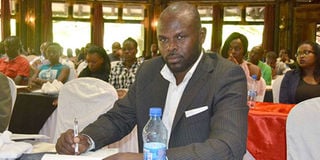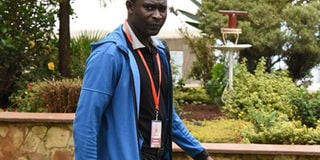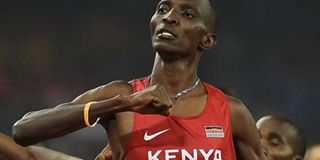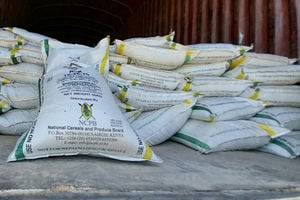Doping bans, loss of fame and fortune drive athletes on the path to self destruction
What you need to know:
- Bungei emphasises the importance of the athletes having a stable family life.
Road runner Alex Korio Oliotiptip and marathoner Mikel Kiprotich Mutai became the latest Kenyans to be suspended by the Athletics Integrity Unit (AIU) early this month for violation of anti-doping rules.
While news of Kenyan athletes getting banned or suspended for doping is slowly becoming the new normal, it is the effect of the sentences on the athletes that is worrying. How do the athletes handle such sanctions? And indeed, how are Kenyan athletes handling challenges and failures in life?
Former world 1,500 metres champion Asbel Kiprop, who was banned for four years for testing positive for erythropoietin (EPO) in an out-of-competition test in 2017, has declared his innocence and taken the fight to AIU’s doorstep.
Controversial videos of the runner emerged online of him kissing a woman who wasn’t his wife in public and another of him speeding on a busy highway. Kiprop has never shied away from talking about how the doping ban slapped last year affected his life negatively. His marriage broke down and he almost went into depression.
“All the people I had housed left me and my rivals openly ridiculed me. My opponents said that they had realised that I had been beating them in races through doping. There was a lack of trust and it can get worse when it comes to people who are closer. The only people who came through for me were my parents and Inspector General of Police Hillary Mutyambai,” Asbel recently said in an interview on TV show ‘Unscripted With Grace’ which ran on NTV.

A screen grab of Asbel Kiprop (left) during his interview with Grace Msalame on NTV lifestyle show ‘Unscripted' on April 4, 2020. PHOTO | ELIAS MAKORI |
“I became an alcoholic, my wife left and friends deserted me. I never planned to end my athletics career this way, and that is why I am so determined. I know it will be hard for me to return strongly to the level where I was, but I have a point to prove since I still have the energy to run,” Asbel added.
Another athlete whose star came crashing is former Olympic women’s marathon champion Jemimah Sumgong. She was banned for eight years after testing positive for erythropoietin. Before she was handed the lengthy ban, Sumgong was preparing to defend her London Marathon title in 2017 but she was given a two-week suspension prior to the race.
NOT BEEN EASY
Sumgong said after her fall from grace, it has not been easy for her. She said that her family has been her pillar as she struggled to make ends meet after she was banned.
“It was tough for me when I was suspended. There was no one to turn to. I want to thank my husband, Noah Talam, who gave me support all through,” she said.

Kenya's Jemima Sumgong wins the Elite Women's race of the 2016 London Marathon in central London on April 24, 2016. AFP PHOTO | JUSTIN TALLIS
The former London Marathon champion said the toughest part that brings down most athletes accused of doping is the loss of training partners and friends.
"It was really a bad experience for me because I lost friends and even those who used to train with me shied away," Sumgong said.
To add insult to injury Sumgong lost her job too after the ban. She said that haunts her to date and she almost slid into depression.
"I thank God because I had started my own business. After the whole saga, I decided to manage the business fully, and I’m happy it is now doing well. One has to invest well while still active in the sport because you never know what will happen in the future," she said.
COUNSELLING DEPARTMENT
Sumgong urged Athletics Kenya (AK) to create a counselling department for the sake of upcoming athletes.
"There are athletes who might end up being banned for committing errors unknowingly and it can affect them mentally. AK needs to come up with a counselling department because these people are also human despite having done something wrong," added Sumgong.
Kenya’s 800m great Wilson Bungei sank into alcoholism after winning gold at the Beijing Olympic Games in 2008. However, he was able to overcome the challenge and is now a motivational speaker and a businessman.

The 2008 Beijing Olympics 800m champion Wilfred Bungei at the Athletes Kenya Athletes' Conference in Safari Park, Nairobi on December 6, 2018. PHOTO | SILA KIPLAGAT |
Bungei said Kenya does not have mechanisms to shield its sportspeople from such negative vices. He asked athletes’ managers to play an active role in guiding runners besides booking races for them.
“From my experience, I know most high-profile Kenyan athletes struggle with overcoming failure, be it doping bans, loss of form or any other challenge. There is a lot of loneliness up there when they are winning and success has come to their lives. They may have very many superficial friends but in normal lives away from athletics, they are very lonely people and it becomes even worse when they are undergoing problems,” Bungei told Nation Sport.
“They are, therefore, easily lured into alcoholism, promiscuity and other destructive lifestyles just to hide from the real monster that brought them down. This really doesn’t help and ends up destroying their careers and lives in general,” he added.
Bungei emphasises the importance of the athletes having a stable family life.
“Many athletes hardly realise they have a problem. When they hit rock-bottom they want to hide since they are regarded as celebrities and they, therefore, do not seek help. Loss of financial streams and fame is hard. It is much tougher if your family is not there for you.
“I believe families are the most important part of our lives but we tend to focus so much on our careers and success. We should have a balance. If you ignore your family then you will have problems,” he said.
Bungei said the country lacks mechanisms and the capacity to shield athletes. He said, “If I never sought help I wouldn’t be where I am. I could have even drunk myself to death.
“My advice to athletes who are going through problems, be it alcoholism, depression or other issues of life, find the courage to admit that you have a problem and have your family close. The next thing after acceptance is seeking help and you will be on your way to recovery,” he said.
Bungei urged managers of the affected athletes to do more than booking races and making money.
“Athletics Kenya (AK) has a role to play in educating and sensitising athletes. But we really cannot blame them when athletes go down the wrong path because of their personal decisions.
“Athletes’ managers should advise runners on the dos and don’ts and where to invest. They should ensure that athletes are okay on and off the track,” Bungei said.
KIPSANG BACKS SUMGONG
Former world marathon record holder Wilson Kipsang backed Sumgong on the need for AK to set up a counselling unit for athletes.

Wilson Kipsang of Kenya crosses the line to win the men's race in the 2014 London Marathon on The Mall in central London on April 13, 2014. PHOTO LEON NEAL | AFP
The 37-year-old athlete was suspended early this year "for whereabouts failures and tampering", which violate World Athletics' anti-doping rules.
Kipsang said that many athletes who are suspended end up turning to alcohol “to avoid stress” which builds following a ban.
"Athletics Kenya has to come up with a counselling department that will help athletes overcome the situation. It is not the end of life when you are suspended," Kipsang said.
He also said that most athletes who are caught up in doping suspensions get lonely because they are avoided by training mates and friends.
"Once the Athletics Integrity Unit suspends an athlete, he loses friends and training mates immediately. That affects him or her mentally. That low moment is crucial as if care is not take, an athlete can easily become depressed," the former Berlin Marathon champion said.
On family disputes, Kipsang said misunderstandings arise mostly due to lack of money since the suspended runner no longer brings in a pay cheque like they used to when they were successful.
"Unless the affected athlete has investments, there might be some problems because there is no more flow of cash," Kipsang said.
RUDISHA DISTRACTED
Loss of form, injuries and other personal challenges almost led former 800m world champion David Rudisha down the path of destruction.

David Rudisha walks out of the Athletics Kenya Conference at Hotel Sirikwa in Eldoret town, Uasin Gishu County on December 5, 2019. PHOTO | JARED NYATAYA |
From going through a painful separation from his wife, death of his father, surviving a horrific car accident, Rudisha admitted to Spikes Magazine that he was on a path to self-destruction.
"With everything else going on in my life, the pressure sometimes got to me. To release it, I'd often hang out with friends, partying too much. It's not something you intend to come your way but sometimes, during periods like that, you look for a bit of destruction to distract yourself,” he said in an interview in October last year.

World 800m Record holder David Rudisha during an interview at Kenmosa Village in Eldoret town, Uasin Gishu County on August 29, 2019. PHOTO | JARED NYATAYA |
Finnish psychologist Annika Ingendia, who has worked with the Harambee Stars under 17 side, Harambee Starlets, Impala rugby team, Kenya 7s, among other sports teams, said Kenyan athletes rarely seek psychological support.
“From my personal experiences, there are many different reasons why athletes start to engage in the abuse of alcohol, promiscuity, or any other self-destructive behaviour. However, for others, the first step towards alcohol or a sexual activity is the start of an addiction. The problem is, people notice their addictive behaviours when it is too late and the problem has become very severe. Without professional help, they are not able to change and abstain from it,” Annika told Nation Sport.

Kenya's Asbel Kiprop celebrates after winning the final of the men's 1500 metres at the 2015 IAAF World Championships at the "Bird's Nest" National Stadium in Beijing, China on August 30, 2015. AFP PHOTO | OLIVIER MORIN
“Here lies one of the problems in my view. Seeking counselling has been stigmatised in the Kenyan society and in many other societies around the world. From talks with various Kenyans, I have understood that the older generations especially do not support psychological therapy or counselling. Besides the stigma of seeking help, it is often difficult to find affordable qualified counsellors.
“There are various reasons why athletes will engage or develop alcohol addiction. Some reasons include family members such as parents or older siblings, who are addicted to alcohol, trying to keep up with friends and peers and fit in the "culture / environment" or avoiding to deal with problems and using alcohol to forget and create a happy place.
“Our friends and peers have a huge impact on our development and creating habits. Being surrounded by people who enjoy drinking alcohol, partying, and engaging in promiscuity most likely will lead a person to start engaging in similar behaviours. Here often lies another problem as everything is fun and not serious. The beer after a successful game, celebrating with the teammates, receiving attention and offers for sexual adventures, and so on. It seems innocent and just like a good time,” Annika said.
“The feeling of joy, being in control, and increasing confidence when being able to share about the many different partners the person is engaging with. Athletes often realise too late when the use of alcohol turns into abuse and the adventures turn into an escape from responsibility. It easily happens that they don't see the negative consequences before it is too late.
“Once they are addicted to any behaviour or substance denial of it is common. To realise that we need help to stop a certain behaviour takes time and it will get worse before it will get better, if it does. Then, there are athletes who struggle with many other problems from home or even mental disorders which can cause them to start drinking,” she added.
Annika emphasised that athletes find it tough to take up challenges as they are used to success and fame from a young age.
“The loss of form, financial resources, or ban for doping are very difficult situations. Athletes often tend to identify themselves, their self-worth, and all that they are through their sport. In other words, they don't know who they are without the sport. Sports, and especially professional sports, take up most of their lives and time.
“Often they don’t develop another identity and when their athlete identity is taken away they fall into a dark place. Some will recover from this without starting to drink, abuse substances, or careless sexual activity. Others will use exactly these things to forget their problems - to escape from having to face one of the most difficult questions in our life of who we are and what our purpose,” Annika said.
“Whenever we are going through transitions in life and everything around us changes we are most vulnerable and look for something to feel safe, happy, and in control. This can then easily end up in addiction. Instead of making things better, the athletes make it worse for themselves. They won't return to their previous shape or better, they won't be able to create an income through sports anymore. When falling into addiction people will start to turn away from them and lastly, their families might too,” she added.
Annika opines early awareness on the effects of alcoholism and other vices would help change the course for athletes.
“I think it is very important to start by raising awareness on alcohol abuse, promiscuity and other self-destructive habits of athletes. We need to start at an early age and educate sportsmen and women about the dangers of the vices. This requires open and honest conversations about these topics, giving our athletes enough information to make valid decisions on such matters. Secondly, coaches, managers, and team doctors need to be educated to see the early signs and start engaging with the player at risk. Knowing that every player who is facing a transition needs extra attention and care,” she said.
“Thirdly, we need to start offering professional help to players who have developed an addiction and live out self-destructive behaviours. These means breaking down the stigma associated with counselling, seeing a psychologist, and receiving help when we need it. This is a fight that has been going on for years and years and still people are perceived as weak when seeking the help of a psychologist.
“We also need to help and support our athletes in their holistic development. We need to help them find out who they are besides the rugby player, football player, swimmer and incorporating sport psychology in technical bench is necessary.”






